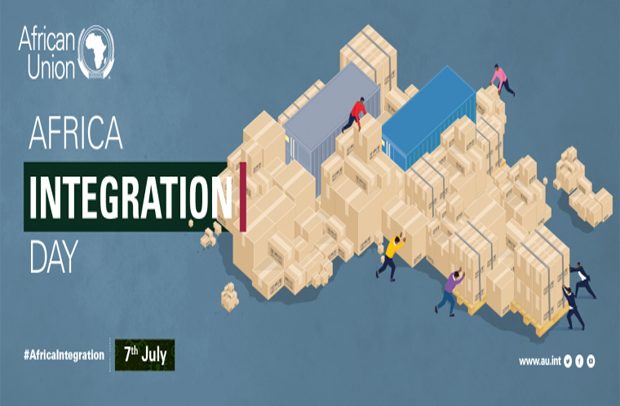The Ministry of Foreign Affairs and Regional Integration has joined in the celebration of the 2020 edition of the Africa Integration Day (AID).
During the 12th Extraordinary Summit of the Heads of State and Government of the African Union in Niamey, Niger, on 7th July, 2019, the operational phase of the Africa Continental Free Trade Area (AfCFTA) was launched.
The Summit decided that 7th July of every year should be designated as “Africa Integration Day”.
The day is not to be observed as a holiday but it is to commemorate the operationalisation of the AfCFTA and to promote economic integration across the continent.
It is intended to celebrate the progress made in the implementation of the African Integration Agenda, including the African Continental Free Trade Agreement and its achievements.
It is also to galvanize and mobilize Africans within the continent and abroad, towards accelerating and fully operationalising the ideals and objectives of the African Economic Community as enshrined in the Abuja Treaty of 1991.
In a statement, the Foreign Ministry recounted that
since the coming into effect of the Abuja Treaty in May 1994, Africa has made major strides towards an integrated continent.
” A significant milestone was reached with the coming into force of the Agreement establishing the AfCFTA. It is estimated that the elimination of tariffs as a result of the AfCFTA could boost trade in Africa by 15-25% in the medium term and create a US$3.0 trillion economic bloc, connecting 1.3 billion people across the continent,” the Ministry says.
It added that “This will make the AfCFTA the largest trading bloc since the formation of the World Trade Organization in 1995.”
The AfCFTA is critical to the development of the continent and is consistent with the development aspirations and policies of Ghana. It holds the potential to increase Africa’s global trade and to facilitate the export of value-added products, according to the Ministry.
” It will contribute to building regional economic infrastructure, fostering food and energy security, generating jobs for the increasing number of young people, alleviating poverty and delivering shared prosperity through the implementation of appropriate policies. The Agreement is expected to open up the African market for the exports of key manufacturing companies in Ghana, whilst attracting foreign direct investment across the value chain and in different compartments of the manufacturing sector. This is why we need to be deliberate, focused and passionate in pursuing this agenda,” it noted.
“The Covid-19 pandemic has, however, affected the start of operations of the AfCFTA Secretariat in Accra, which was scheduled for the end of March 2020 as well as the commencement of trading under the AfCFTA on 1st July, 2020. Ghana has, however, discharged her obligations to ensure the smooth operationalisation of the Secretariat,” the statement said.
The Secretariat of the AfCFTA is based in Accra, Ghana.
“The COVID-19 pandemic has caused the demand for Africa’s commodity exports to plummet and their prices to tumble. International supply chains have also been disrupted, leading to the threat of food insecurity and inadequate medical supplies. African countries must, therefore, take advantage of this difficult situation to diversify their industries and transform their economies for sustainable development,” according to the statement.
“Our determination to fight the COVID-19 pandemic should be equal to our courage and resilience to enhance continental trade for our development. We, therefore, remain resolute in the implementation of the AfCFTA. In that regard, Ghana is working with the African Union Commission to ensure that the AfCFTA Secretariat begins its operations in Accra and that trading under the AfCFTA commences,” it stressed.
Implementing the Boosting Intra-African Trade (BIAT), which consists of seven thematic action areas, is key to accelerating the entire integration process, it said, adding that the Ministry of Trade and Industry, together with other relevant Ministries, is taking steps to develop projects that will boost intra-African trade in the areas of Trade Policy, Trade Information, Trade-related Infrastructure, Trade Finance, Trade Facilitation, Productive Capacity, and Factor Market Integration.
The Ministry is also working towards harnessing the full benefits of the AfCFTA by determining complementary measures in the areas of investment, production, trade facilitation, trade-related infrastructure and import defence as well as a strong mechanism for communication, advocacy and outreach around the AfCFTA instruments, according to the statement.
By Melvin Tarlue

